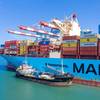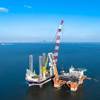Offshore Vessel Operators Suffer As Gulf Oil Output Sags
As seen in the August edition of MarineNews, Susan Buchanan updates readers on the GOM oil production situation.
BP's gushing well was capped more than a year ago but life is hardly back to normal in the U.S. Gulf--where rigs and vessels remain underutilized. At least ten rigs have moved overseas since last summer. Gulf oil production is below pre-spill levels and won't recover anytime soon, analysts say. Issuance of drilling permits picked up this spring as operators agreed to use oil-containment systems but permitting lags earlier rates.
Paul Candies, president and CEO of Otto Candies, LLC, in Des Allemands, La., said offshore activity has increased recently, and “we expect to see a slow trend toward more drilling “ But the marine industry shouldn't get lulled into a false sense of security. “We need to continue to push for more permitting of rigs and simplification of that process,” he said. Candies gave a positive report about his company, saying “all of our platform supply vessels are committed at present for extended periods. We have three inspection, maintenance and repair vessels on long-term commitments, and should have a fourth IMR vessel committed by year end.” Otto Candies is a marine transportation and offshore services company.
At Laborde Marine Management, LLC, in New Orleans, managing member Cliffe Laborde said “I think the worst is over, but we're a long way from getting back to where we were shortly before the Macondo spill.” Laborde Marine, with operations in Morgan City, La., services the deep and shallow water drilling industry.
- Gulf Assets Move Overseas
Laborde provided some recent history, and explained how promising times in the Gulf had turned sour. “In early 2010, as the economy emerged from a two-year recession, the Gulf energy industry was beginning to bloom,” he said. “Utilization rates for deepwater support vessels were high, and charter rates were rising again. The outlook was very good, but then came the spill and the market has languished since.”
Laborde continued, saying “many deepwater vessels and rigs have moved out of the GOM to foreign areas, and many vessels and rigs that stayed in the Gulf are idle now, waiting on BOEMRE to issue new permits.” The granting of new drill permits has been “alarmingly anemic,” he added.
Rigs are underutilized in the Gulf this summer. The fleet utilization rate for all 52, offshore Gulf platforms was 40.4% on July 22, less than half the worldwide usage rate for platforms, according to ODS-Petrodata, Inc. Utilization of mobile rigs in the Gulf stood at 53.7% on July 22.
Meanwhile, other drilling regions in the world are closer to full capacity. In Europe and the Mediterranean, 96.3% of all platform rigs and 87.7% of mobile rigs were in use in late July. Oil and marine companies can't afford to keep assets in waters where they're not needed. Since the start of the deepwater moratorium in May 2010, at least ten rigs have left the Gulf of Mexico, and headed to Angola, Egypt, Congo, Nigeria, French Guiana, Liberia, Brazil and Vietnam. One of those rigs returned to the Gulf in March, however, and another is slated to come back this fall.
- Shallow Water Activity Could Slow Further At Late Year
In Morgan City, La., Dave Barousse, business development director at Fleet Operators, Inc., said “in the shelf market, or non-deep water at depths of 1,000 feet and less, we have not seen an increase in business because of the end of the moratorium. However, business has been steady as a result of the normal construction and maintenance work offshore that generally takes place during the summer months.” But, he said, activity is considerably slower than before the deepwater moratorium.” Fleet Operators owns and charters supply vessels for the offshore oil and gas industry. And Barousse said “we're preparing for things to slow down tremendously once winter weather is upon us. The outlook is not very positive at the moment, and will be even worse by the end of the year.”
- Gulf Oil Output Projected To Decline This Year and Next
Crude oil production from the federal Gulf of Mexico is expected to shrink from 1.64 million barrels per day in 2010 to 1.49 million bpd this year and 1.38 million bpd in 2012, according to the U.S. Energy Information Administration's short-term energy outlook, released in July. Gulf output should drop by 150,000 barrels a day this year and another 110,000 bpd in 2012.
The EIA said this year's decline stems from lower production in existing fields, last year's drilling moratorium and a subsequent delay in issuing new drilling permits. Even before the BP spill and the drilling ban, the EIA expected Gulf oil output to fall this year.
- Issuance of Drilling Permits Lags Pre-Moratorium Pace
Jim Adams, president and chief executive of Offshore Marine Service Association, an industry group in Harahan, La., said the Administration’s approval rate for exploration and development plans is down 85% from pre-moratorium levels, and the number of drilling permits covered by exploration and development plans is off nearly 65%. He cited a study called “Restarting the Engine--Securing American Jobs, Investment and Energy Security,” released by IHS CERA and IHS Global Insight in late July.
Adams said "no industry can operate with that kind of shutdown.” He said the Obama Administration is sending rigs, boats and jobs overseas in an indefensible policy. OMSA represents more than 250 member companies, including about 100 firms that own and operate marine-service vessels. “The offshore marine industry remains in a state of crisis, almost as if the drilling moratorium was never lifted, and the only relief from excess capacity is overseas opportunities,” Adams said. “The Administration has strangled offshore drilling, and until that changes, we can't look for better times in the marine industry.”
Adams said Washington has choked the Gulf shallow sector though it never had any significant spills. “There's no reason that shallow water permits shouldn't be 100% of what they were in the spring of last year, but we're not even close,” he said. “The Administration isn't interested in shallow-water or deepwater exploration.”
OMSA sent a letter to President Obama in February complaining about suspended offshore drilling and its impact on marine industry jobs. “We never heard back from the Administration and that's because they know we're right,” Adams said. According to OMSA, more than 50,000 wells have been safely drilled in the Gulf of Mexico over the past fifty years.
- Problems with Rig Permit Numbers
Adams said “BOEMRE numbers on Gulf drilling permits are completely misleading. We need to know how many wells are brand new that will lead to exploration and how many wells are being re-permitted from last year.” Someone looking at BOEMRE's website might think that new wells are keeping pace with pre-moratorium levels, but they aren't, he said. He added that oil and marine industries need to be able to compare how many exploratory wells are permitted. “It takes an average seven permits for a well to start producing,” he noted. In March, Senator David Vitter (R-La.) also sent a letter to U.S/ Interior Dept. Secretary Ken Salazar and BOEMRE director Michael Bromwich, complaining about inaccurate, federal information on Gulf drilling permits.
In their July study, IHS CERA and IHS Global Insight said an analysis of BOEMRE data provided several findings. “The current pace of plan and permit approvals is significantly below historical norms and indicates that the process is not working smoothly,” researchers said. And “the growing backlog of plans awaiting approval indicates that the industry remains ready to invest as quickly as it is permitted to do so.”
- Rigs and Vessels Adopt Oil Containment Systems
One way to get your vessel hired in the Gulf is to outfit it with spill-response equipment. After BP's accident, BOEMRE issued new regulations requiring that rig operators be able to respond to subsea leaks and surface spills. In late July of this year, two Hornbeck Offshore Services vessels were added to the fleet of ships that can respond to a Gulf accident, the Marine Spill Response Corp. said. MSRC is a non-profit company that was established in 1990. Hornbeck's HOS Centerline and HOS Strongline are vessels with oil-skimming systems, ocean boom, support boats and navigational systems that can support skimming at night and in stormy weather.
Hornbeck, based in Covington, La., in late May posted its first quarterly loss in over six years, but said it was diversifying by moving vessels into foreign markets. This summer, BOEMRE director Bromwich said his agency will issue more safety measures for Gulf rigs soon. At the fifth, annual World National Oil Companies Congress in the U.K. in late June, he said “offshore drilling in the U.S. and around the world will never be the same as it was a year ago. Changes that we have put in place will endure because they were urgent, necessary and appropriate.” More regulations will be issued, but not at the frantic pace of the past year, he said.
- Report Delayed On Who's To Blame for Spill
In late July, a U.S. team examining the causes of the BP spill delayed the release of a final report as it continued weighing evidence. BOEMRE and the U.S. Coast Guard were expected to issue results of a joint investigation on July 27 but said they needed more time. The Gulf marine industry wants additional rigs to start drilling soon. Laborde said “the oil companies, the rig operators and the energy-service companies are all anxious and ready to get back to work. This would create jobs, improve the economy, increase government revenues through royalty income and taxes, and enhance our national security by lessening dependence on foreign oil.” Where the Gulf oil and marine industries go from here is up to decision makers in Washington, he said.












